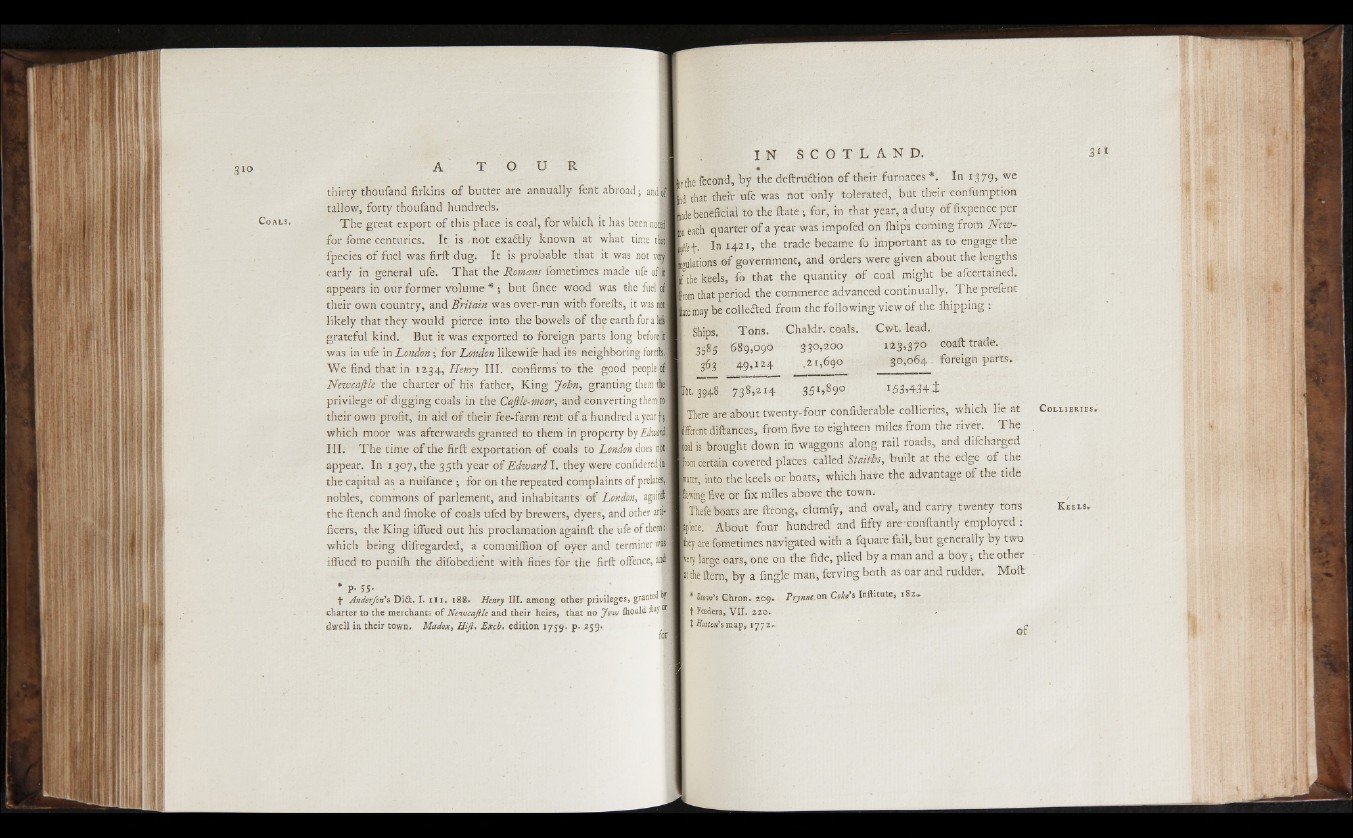
thirty thoufand firkins of butter are annually fent abroad; ar.ij]
tallow, forty thoufand hundreds.
Coals. The great export of this place is coal, for which it has been noJ
for fome centuries. It is , not exadtly known at what time thaj
fpecies of fuel was firft dug. It is probable that it was not vjl
. early in general ufe. That the Romans fometimes made ufe o fij
appears in our former volume * ; but fince wood was the fuel «)
their own country, and Britain was over-run with forefts, i t was nojl
likely that they would pierce into the bowels of the earth for a lti
grateful kind. But it was exported to foreign parts long before i|]
was in ufe in London; for London likewife had its neighboring forelM
We find that in 1234, Henry III. confirms to the good people ofi
Newcafile the charter of his father, King John, granting them thsl
privilege of digging coals in the Cafile-moor, and converting them I ]
their own profit, in aid of their fee-farm rent of a hundred a yearf jj
which moor was afterwards granted to them in property by Ehim
III. The time of the firft exportation of coals to London does not!
appear. In 1307, the 35th year of Edward I. they were confuted! 1
the capital as a nuifance ; for on the repeated complaints of prelatwf
nobles, commons of parlement, and inhabitants of London, agaiifl
the ftench and fmoke of coals ufed by brewers, dyers, and other arta
ficers, the King iflued out his proclamation againft the ufe of then®
which being difregarded, a commifilon of oyer and terminer
ilfued to punifh the difobedient with fines for the firft offence, a#
* P- 55- I I ■ 111 t jindir/on'sTDiSi. I. i n . 188. Henry III. among other privileges, granted oj|
charter to the merchants o f Nenucaßle and their heirs, that no Jew ihouM I
dwell in their town, Madox, H iß. Exch. edition 175y , p. 259. M
ha
I N S C O T L A N D .
•
ir the fecond, by the dtftruftion of their furnaces*. In i j 79> we
Id that their ufe was not -only ■tolerated, but their confumption
Tide beneficial to the ftate; for, in that year, a duty of fixpence per
|n each quarter off a year was impofed on ihips coming from New-
pfc-j-. In 1421, the trade became fo important as to- engage the
fralations of government, and orders were given about the lengths
I f the keels, fo that the quantity of coal might be afcertained.
Rom that period the commerce advanced continually. The prefent
Jatemay be colle&ed from the following view of the ihipping :
Ships. Tons. - Chaldr. coals. Cwt. lead,
3585 (¡89,090 330,200 i 2.3>37° coaft trade.
363 49,124 .21,690 30,064. foreign parts.
Rot. 3948 738,214 351,89° 153)434 t
J There are about twenty-four -confiderable collieries, which lie at
|ffereht diftattces, from five to eighteen miles from the river. The
il is brought down in waggons along rail roads, and difcharged
oft certain covered places called Staiths, built at the edge of the
later, into the keels or boats, which have the advantage of the tide
lowing five or fix miles above the town.
['Thefe boats are ftrong, clumfy, and oval, and carry, twenty tons
Jpiece. About four hundred and fifty are-conftantly •employed :
__y are fometimes navigated with a fquare fail, but generally by two
lery large oars, one on the fide, plied by a man and a boy, the other
Rtthe ftem, by a fingle man, ferving both as oar and rudder. Moft
* Stow1 s Chron. 209* Prynne.on C e id s Inftitute, 182 ,
I t Fcedera, VII. 220»
I t H««oa’smap, 1772*
C o l l i e r i e s
K e e l s »
til
erf